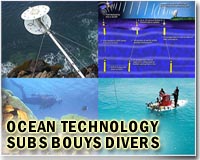 |
for Hot Zone blog Moffett Field CA (SPX) Sep 02, 2010 Mention Arctic ice melt and the first image to come to mind is the northern Atlantic. Mostly Greenland. Sometimes the far reaches of Canada or Iceland. Maybe it's because the northern Atlantic is the same ocean that researchers from major institutions dip their toes in in 100-plus degree heat waves. But way out in the Pacific, researchers at the University of Hawaii are taking a different look at the climate. In a paper published this week in the journal Science, oceanographer Axel Timmermann and colleagues explained what they found out by looking at sediment cores from the northern Pacific. As the last major ice age ended 17,500 years ago, massive north Atlantic ice sheets melted and all the added fresh water caused the collapse of the Atlantic Ocean conveyor belt. That should have plunged the northern Hemisphere into a deep freeze. But it didn't quite do that. Timmermann et. al found that the northern Pacific may have been a moderating force on the climate, helping it warm a bit. It did this by creating its own conveyor belt. "Basically the Atlantic and the Pacific swapped their roles for about 2,000 years," said Timmermann. The salinity that used to be in the Atlantic, shifted over to the north Pacific through new rain patterns and built up there to the point where dense, salty water sunk. The sinking water had to be resupplied by warmer water flowing poleward. "This warm water cooled, releasing heat into the atmosphere and hence the warming effect on the climate in the Pacific realm," Timmermann said. "So in some sense when the Atlantic shut down ... the Pacific Ocean served as a kind of backup generator for the climate." Today's situation is a bit different because of new topography. Because the Bering Straight is now open (during the last glacier melt it wasn't), there's more mixing between the northern Pacific and Atlantic Oceans. So as Greenland melts, the decrease in salinity due to the added freshwater could easily spill over into the Pacific, preventing build up of salty water there. Still, it's clear by this research that the Pacific is important to the climate system in ways we know little about. But of course it would be. It's the biggest ocean of them all.
Oceans away Now another study of around the same time period was published recently by researchers at Oregon State University in the journal Earth and Planetary Letters. This study examined the tallest mountain in the world. Not Mount Everest - that's the highest. Mount Mauna Kea, on the Big Island of Hawaii rises some 30,000 feet from the Pacific Ocean floor, making it the actual tallest, even though most of it's underwater. Mauna Kea, if you can believe it, once had a large glacial ice cap of more than 40 miles some 21,000 years ago. Peter Clark, a geosciences professor at OSU looked at how that glacier disappeared as the Ice Age ended and the planet become warmer. One surprising discovery, found in Helium isotope deposits within boulders, was that the glacier began readvancing back again some 15,400 years ago. Looking at the historical record, that change matched a major slowdown at the time in the Atlantic conveyor belt. Normally you think of the Atlantic conveyor belt as controlling temperatures in Europe and the northern Atlantic. When it slows down it gets chillier. But the findings from OSC confirm suspicions that the rest of the planet changes, too. At Mauna Kea cooled down as well and precipitation jumped by quite a bit. Maybe this was because of an uptick in storm events? When the Atlantic gets sluggish, the whole world catches a cold.
Share This Article With Planet Earth
Related Links Hot Zone blog Water News - Science, Technology and Politics
 Delhi notes China's Indian Ocean 'interest'
Delhi notes China's Indian Ocean 'interest'New Delhi (AFP) Aug 31, 2010 India on Tuesday said China was demonstrating "more than normal interest" in the Indian Ocean as two Chinese warships made a rare visit to military-ruled Myanmar. India is watchful of China's growing presence in the region, including its major investments in ports being built in Sri Lanka and Pakistan. The Chinese ships docked in Yangon on Sunday afternoon and were set to launch a series ... read more |
|
| The content herein, unless otherwise known to be public domain, are Copyright 1995-2010 - SpaceDaily. AFP and UPI Wire Stories are copyright Agence France-Presse and United Press International. ESA Portal Reports are copyright European Space Agency. All NASA sourced material is public domain. Additional copyrights may apply in whole or part to other bona fide parties. Advertising does not imply endorsement,agreement or approval of any opinions, statements or information provided by SpaceDaily on any Web page published or hosted by SpaceDaily. Privacy Statement |